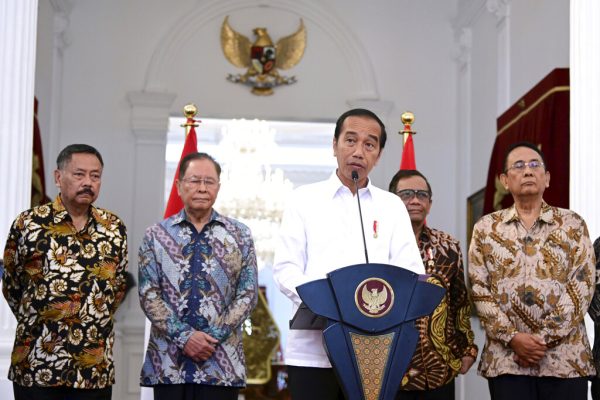
Indonesian President Joko “Jokowi” Widodo has admitted that the Indonesian state has been responsible for serious human rights violations, vowing to compensate the victims of these abuses and prevent such abuses from happening again in the future.
In a speech televised from the Merdeka Palace in Jakarta yesterday, Widodo acknowledged “with a clear mind and sincere heart” a total of 12 incidents categorized as gross human rights violations that occurred across the archipelago between the 1960s and early 2000s.
“I, as the Head of State of the Republic of Indonesia, admit that serious human rights violations have indeed occurred in various events,” Jokowi said, adding, “I deeply regret it.” During his remarks, The Associated Press reported, Jokowi was flanked by Coordinating Minister for Political, Legal and Security Affairs Muhammad Mahfud and members of a team that he formed last year to seek non-judicial settlements for serious past human rights violations. The group includes academics, former generals, and activists.
“We are trying to recover the rights of victims in a fair and wise manner, without negating a judicial settlement,” Jokowi said, adding that he hopes his government’s efforts “can heal the wounds of the nation.”
Among the most significant of the 12 incidents was the Indonesian military’s destruction of the Indonesian Communist Party (Partai Komunis Indonesia, PKI) in 1965-66. The massacres began after the failure of an apparent coup attempt by dissident army officers, who kidnapped and killed six senior Indonesian army generals on the night of September 30 and October 1, 1965.
Over the subsequent months, at least half a million actual and suspected communists were killed by the army and its auxiliaries, while a further million were locked up without charge, some for decades. As Geoffrey Robinson wrote in his book “The Killing Season,” the destruction of the PKI amounted to “one of the largest and swiftest, yet least examined instances of mass killing and incarceration in the twentieth century.”
Among the other abuses examined by Jokowi’s commission were the torture of suspected rebels in Aceh in 1988-1989, a deadly raid on an Islamic community in Lampung in 1989, the kidnapping and disappearance of anti-government activists in 1997-1998, and the instigation of anti-Chinese riots in Jakarta and other major cities in the tumult that accompanied the fall of President Suharto in May 1998.
Jokowi’s welcome and surprising admission distinguishes Indonesia from many of its neighbors, whose leaders are hostile to any form of accountability for past rights abuses, especially those that indict serving members of government. However, while Jokowi said that he had not closed the door on judicial settlements, the prospect of any move in this direction is likely to unsettle important centers of power in Indonesia.
For instance, Jokowi’s Defense Minister Prabowo Subianto, a former general and ex-son-in-law of Suharto, has been credibly implicated in a list of human rights abuses, including atrocities committed in the conflict zones of Timor-Leste and Aceh. He was also the head of the Army’s Special Force Command, known as Kopassus, when it kidnapped and “disappeared” anti-government activists in 1997-1998, one of the episodes acknowledged yesterday by Jokowi.
In this vein, human rights groups welcomed the government initiative, but expressed hopes that Jokowi’s move would not pave the way for the closing of these cases or the granting of impunity to those responsible for them. “The protracted settlement of cases of past serious human rights violations has not only caused prolonged suffering for the victims, but has also become a stumbling block for national political reconciliation for the government,” the Asian Human Rights Commission said in a statement, according to The AP.
It is also unclear whether the Indonesian leader’s regret will lead to alterations to the official historiography of the Indonesian state. When it comes to the events of 1965-66, the country’s museums and schoolbooks still justify the crackdown on the grounds that it rescued Indonesia from a PKI coup, while the seven army generals murdered in the triggering coup attempt are treated as martyrs to the national cause. (One example is the “Museum of PKI Treason” in Jakarta.) Meanwhile, the PKI remains outlawed and communist teachings were banned, decades after the party’s destruction. Will some of these narratives be altered, now that the head of state has recognized the atrocities that are entwined with them?
Finally, Jokowi’s admission is interesting to view in light of his administration’s current policy in Papua. The situation in the eastern region has worsened during Jokowi’s time in office, particularly since his second term began in 2019, as the deepening encroachment of the Indonesian state has prompted growing numbers of attacks by pro-independence insurgents. The government has responded by strengthening its security presence in the region, particularly in Papua province, prompting further attacks.
In November 2020, the regional United Nations Human Rights Office expressed its concern about the “escalating violence” in the region, noting, “Military and security forces have been reinforced in the region and there have been repeated reports of extra-judicial killings, excessive use of force, arrest and continuous harassment and intimidation of protesters and human rights defenders.”
Jokowi’s government has defended its policy in Papua on the grounds of national security: that it is seeking to stem a rash of “terrorist” attacks against the region’s legitimate government. But then, similar justifications were proffered for many of the rights abuses that Jokowi mentioned in his speech, including the deadly raids against civilians in Papua province between 2001 and 2003.
It would be churlish to complain about such a significant admission by a Southeast Asian leader, especially given the prevailing regional norms (or lack of them). But time will tell whether this is a case of sincere commitment, or a case of expressing contrition for past abuses in order to detract from present ones.
Indonesia’s Jokowi Admits to Serious Past Human Rights Abuses
Source: Frappler

0 Comments